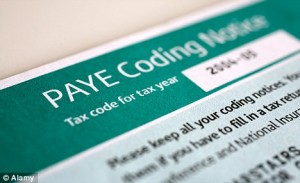 Every worker needs a tax code and this is what your employer will use to work out how much tax you need to pay.
Every worker needs a tax code and this is what your employer will use to work out how much tax you need to pay.
Tax codes are usually made up of a combination of numbers and a letter and will look like this: 1100L
This is the tax code currently used for most people born after 5 April 1938 with one job.
Numbers: these refer to how much income you can have before you pay tax. If you have 1100 in your tax code this means that you can earn up to £11,000 without paying tax.
Letters: Usually one letter; it refers to your situation and how it affects you tax-free Personal Allowance. ‘L’ shows that you are entitled to a basic tax-free Personal Allowance.
Your payslips, P45, end of year P60 or Pay Coding Notice letter will show your tax code.
If you don’t have a tax code, HMRC will send you one once your employer has filled out a new starter form.
Tax code letters
Not everyone has the letter L in their tax code. Other letters refer to your situation and how it affects your tax. Here are some examples:
- K in a code could mean that tax is being paid through wages that are owed from a previous year. Or you are getting the State Pension or benefits from work such as a company car.
- M means you’re receiving a transfer of 10% from your partner’s Personal Allowance.
- N means 10% of a your Personal Allowance has been transferred to your partner.
- W1 (week 1) or M1 (month 1) are emergency tax codes. This means that tax is based only on what is paid in the current pay period – either week or month – and not the whole year. These codes are known as ‘non-cumulative’.
Emergency tax codes are usually updated automatically after you get your P45. An employee will always start a new tax year with a normal tax code, not an emergency one.
There are more tax code letters…You can read about them here.
When a tax codes changes
If your circumstances change either you or your employer will need to tell HMRC and it will issue a new tax code.
The most common reasons for a tax code change are if you start or stop getting:
- Taxable benefits from the job, such as a company car
- Taxable expenses from work
- Income that isn’t being taxed, such as rental income
- Taxable State benefits such as State Pension.
A tax code will also change if you need to pay tax from a previous year.
HMRC will send out a Pay Coding Notice if the code changes. This will tell you what the code is and how it’s worked out.
What to do if a tax code is wrong
If you notice your tax code is wrong you’ll need to speak to HMRC. You can call 0300 200 3300 or fill out the form online.

